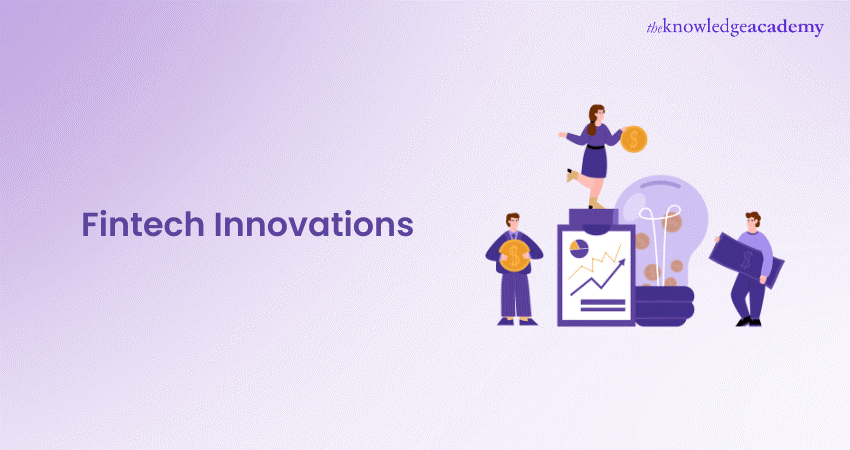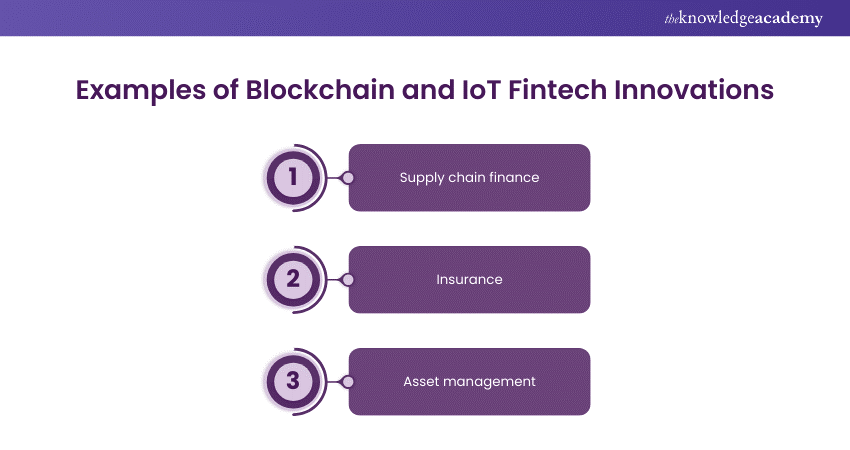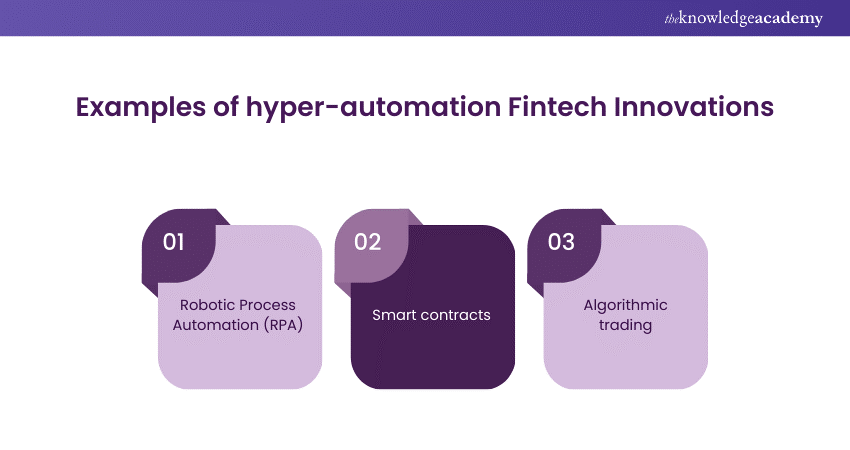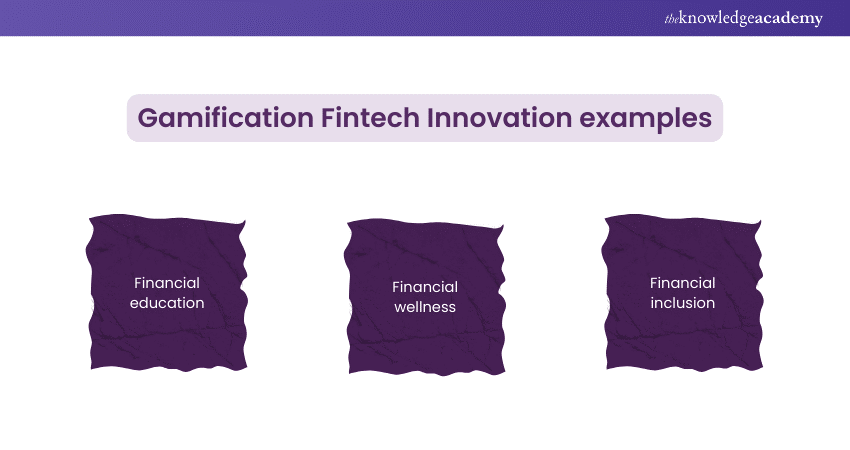We may not have the course you’re looking for. If you enquire or give us a call on 01344203999 and speak to our training experts, we may still be able to help with your training requirements.
We ensure quality, budget-alignment, and timely delivery by our expert instructors.

In a world where technology meets finance, the term "Fintech Innovation" is redefining the future. Imagine managing finances with a swipe, AI-guided investments, or real-time blockchain-secured transactions. Sounds futuristic? It's happening now. Fintech Innovations are not just buzzwords; they're revolutionising how we interact with money, offering unprecedented efficiency, security, and convenience.
Curious about how these innovations can impact your life or business? From AI-driven advisors to mobile payments, the Fintech revolution is here to make your financial interactions smarter and more intuitive. Read on to discover the innovations shaping the future of finance!
Table of Contents
1) Why is Fintech Innovation essential?
2) Most popular Fintech Innovation
a) Blockchain and IoT
b) Artificial Intelligence
c) Payment processing solutions
d) Open source and SaaS
e) Hyper automation
f) Low-code platforms
g) Cloud Computing
h) Digital identity verification
i) Gamification
j) Regulatory technology
3) Conclusion
Why is Fintech Innovation essential?
Exploring Fintech Innovation is essential for you because it can help you:
a) Keep abreast of the newest trends and changes in the finance industry.
b) Comprehend the potential benefits and hazards linked to various financial technology solutions.
c) Make educated choices regarding your financial objectives and requirements.
d) Access better and more affordable financial services and products
e) Support and participate in the Fintech ecosystem
Most popular Fintech Innovation
Fintech Innovation is the process of creating new or improved solutions that meet the needs and difficulties of the financial industry. Fintech Innovation is more than just developing new products or services; it is also about changing how people deal with money, information, and others. While some Fintech advancements are entirely new creations (Inventions), many are improvements or new applications of existing technologies (Innovations), illustrating the difference between Innovation vs Invention. In this section, we will examine the most popular Fintech Trends and innovations that are changing the financial industry and influencing our lives.
Blockchain and IoT
Blockchain is a distributed ledger technology that enables secure and transparent transactions without the need for mediators. The Internet of Things (IoT) is a network of connected devices capable of collecting and sharing data. Both Neobanks and Fintech benefit from the combined power of Blockchain and IoT, allowing for the creation of smart contracts, digital assets, and decentralised apps. Some examples of Blockchain and IoT Fintech innovations are:

a) Supply chain finance
Blockchain and IoT can enable real-time tracking and verification of goods and payments along the supply chain, reducing costs and risks for buyers and sellers.
b) Insurance
Blockchain and IoT can enable smart insurance policies that automatically trigger claims and payouts based on predefined conditions and data from sensors, reducing fraud and delays.
c) Asset management
Blockchain and IoT technologies can facilitate the division and digital representation of ownership in physical assets like real estate, art, or gold. This approach enhances liquidity and broadens investor access to these assets.
Stay ahead with the best FinOps Interview Questions and Answers. Perfect your preparation now!
Artificial Intelligence
Artificial intelligence (AI) plays a pivotal role in shaping the future of the Fintech industry. Let’s delve into some key AI applications within Fintech:
a) Robo-advisors: These AI-driven platforms offer automated and personalised financial guidance. By analysing user goals, risk profiles, and preferences, robo-advisors optimise investment portfolios, reduce fees, and enhance efficiency.
b) Fraud detection: AI algorithms excel at detecting and preventing fraudulent transactions. Machine Learning (ML) models analyse patterns, identify anomalies, and enhance security and compliance across financial systems.
c) Chatbots: Conversational AI interfaces powered by Natural Language Processing (NLP) improve customer service. Chatbots can answer queries, provide information, and conduct transactions, enhancing user interaction.
Payment processing solutions
Payment processing solutions are Fintech tools that allow quick, easy, and secure money transfers between people. Some examples of payment processing Fintech Innovations are:
a) Mobile wallets: These apps allow users to keep and spend digital money on their smartphones using NFC, Bluetooth, or QR codes, making contactless and cashless payments possible.
b) Peer-to-peer payments: These apps let users send and receive money directly using email, phone numbers, or social media without needing banks or middlemen.
c) Cryptocurrencies: Digital currencies use advanced coding to keep transactions safe and check them with blockchain technology, making it possible to send money internationally and without central control.
Open source and SaaS
Open source and Software as a Service (SaaS) are software delivery strategies that allow customers to access and use software over the internet rather than installing and maintaining it on their own devices.
Imagine a community garden where everyone contributes seeds and shares the harvest. Open-source software works similarly. It’s created by a community of developers who share their code freely. Fintech apps can benefit from this because it’s like having a toolbox with lots of free tools to build your app.
a) Software as a Service: Think of SaaS as borrowing a fancy kitchen instead of building your own. With SaaS, you access software over the internet—no installation is needed. Fintech startups can use SaaS frameworks to offer financial services (like loans and payments) without reinventing the wheel.
b) Banking as a Service (BaaS): Imagine a bank sharing its services with other businesses. BaaS lets non-bank companies (like e-commerce platforms) provide financial services using APIs and cloud tech.
c) Open banking: Picture a bridge connecting different banks. Open banking lets customers share financial data and get services from various providers. It’s like having options at a buffet—more choices, more innovation!
d) Crowdfunding: Have you ever seen a virtual bake sale? Crowdfunding is like that. People donate funds online for projects or causes. It’s a way to spread kindness and cash through social networks.
Master the art of money management – Join our premier Financial Management Course today!
Hyper automation
Hyper automation is the use of multiple technologies, like AI, robotics, cloud computing, and Blockchain, to automate and improve company procedures and processes. Hyper automation may improve Fintech solutions by increasing speed, efficiency, and accuracy while decreasing expenses and errors. Some examples of hyper-automation Fintech Innovations are:

a) Robotic Process Automation (RPA): RPA automates repetitive, rule-based operations such as data entry, reconciliation, and reporting. This opens human resources and time for more important tasks.
b) Smart contracts: These are like digital agreements that run on blockchains or other ledger systems. They automatically enforce and verify contract terms without requiring intermediaries like brokers or legal processes.
c) Algorithmic trading: In the stock market, computers use algorithms and math models to make trading decisions. These rules help optimise when to trade, at what price, and how much, aiming to improve overall performance and profits.
Low-code platforms
Low-code platforms are a game-changer for anyone looking to create software without getting tangled up in complicated coding. These tools make it easy for people to build and launch applications by using visual interfaces, drag-and-drop features, and ready-made components. Think of it as assembling a puzzle where the pieces are already shaped for you.
In the world of Fintech, low-code platforms are particularly handy. They allow individuals to craft and personalise their own financial apps without needing to rely on developers or IT teams. Here are a few examples:
a) No-code banking
These platforms allow you to design your own digital banking tools—like mobile apps, web portals, or chatbots—without any coding. They offer easy-to-use templates and integrations, so you can customise your banking services to fit your specific needs. No more worrying about writing lines of code; it’s all about tailoring solutions to your requirements!
b) No-code lending
No-code lending platforms simplify the process of creating digital lending solutions. Whether it's setting up loan applications, managing underwriting, or handling loan servicing, these platforms use straightforward workflows and analytics. This makes the lending process much more efficient and easier to manage.
c) No-code investing
No-code investing platforms let you build your own digital investment tools. From robo-advisors to trading bots, these platforms use data and algorithms to help you enhance your investment strategies. And the best part? You don't need any technical expertise to get started. It’s like having a personal investment assistant at your fingertips, ready to help you make smarter decisions.
Cloud Computing
Imagine a vast digital playground where you can access all sorts of tools and services. That’s the cloud! Now, in the Fintech world, this cloud magic helps in several ways:
1) Scalability: Fintech companies can easily expand their services without building new physical infrastructure. It’s like adding more seats to a virtual restaurant when more customers show up.
2) Reliability: The cloud ensures that Fintech services keep running smoothly.
3) Security: When done right, the cloud is as safe as a well-guarded vault. Fintech providers use it to protect your data and transactions.
4) Cost efficiency: Instead of buying tons of servers, Fintech companies rent space in the cloud. It’s like paying for a cosy apartment only when you need it.
Unlock financial excellence: Join our Accounting & Finance Training today!
Digital identity verification
Digital identity verification is verifying the identity and authenticity of a person or entity online using various methods, such as biometrics, document scanning, facial recognition, or video verification. Digital identity verification can enable Fintech solutions by providing trust, convenience, and compliance. Some examples of digital identity verification Fintech Innovations are:
a) KYC/AML
Know Your Customer (KYC) and Anti-Money Laundering (AML) are regulatory requirements that mandate financial institutions to confirm the identity and background of their customers and prevent and report any suspicious or illicit activities. Digital identity verification can streamline and automate the KYC/AML process, reducing the time, cost, and risk involved.
b) E-signature
E-signature refers to the use of digital means to sign and validate documents electronically, such as cryptography, timestamps, and audit records. An e-signature allows Fintech solutions to provide paperless and effortless transactions, which improves the client experience and happiness.
c) E-voting
E-voting refers to the application of digital techniques to cast and count results in elections, such as Blockchain, biometrics, and mobile devices. E-voting allows Fintech solutions to provide secure, transparent, and easy voting, thus enhancing voter registration and participation.
Gamification
Gamification is the procedure of adding game-like aspects and values into non-gaming areas such as Education, Health, and Finance. Gamification may help Fintech solutions by increasing motivation, engagement, and happiness. Some examples of gamification Fintech Innovations are:

a) Financial education
Gamification can help users learn and improve their financial literacy and skills using interactive and immersive games, quizzes, or simulations, increasing their confidence and competence.
b) Financial wellness
Gamification can help users achieve and maintain their financial goals and habits, using feedback, incentives, or social features, increasing their satisfaction and well-being.
c) Financial inclusion
Gamification can help users access and use financial services and products using gamified interfaces, nudges, or rewards, increasing their participation and empowerment.
Regulatory Technology
Regulatory Technology (RegTech) is the application that uses technology to meet and manage governmental requirements and standards such as data protection, privacy, and anti-money laundering. RegTech can help Fintech solutions by implementing automation, ensuring accuracy, and improving efficiency. Some examples of RegTech Fintech Innovations are:
a) Regulatory reporting
RegTech can help financial institutions generate and submit regulatory reports using tools such as data aggregation, standardisation, or visualisation, reducing the complexity and cost involved.
b) Regulatory compliance
RegTech can assist financial organisations by following to regulatory laws and duties by using technologies such as risk assessment, policy management, and audit records, hence reducing their exposure and fines.
c) Regulatory intelligence
RegTech can help financial institutions stay updated and informed about regulatory changes and trends, using tools such as data mining, Natural Language Processing, or Machine Learning, reducing the uncertainty and lag involved.
Transform your career with our comprehensive Fintech Course – Sign up now and lead the digital finance revolution!
Conclusion
Fintech innovation is revolutionising the financial sector, offering unprecedented efficiency, security, and convenience. By embracing these advancements, consumers, investors, and entrepreneurs can stay ahead in the ever-changing financial market. Keep exploring Fintech to unlock new opportunities and drive success.
Want to impress your fintech recruiter? Our Fintech Interview Questions are here to help you succeed—grab your guide today!
Frequently Asked Questions
What are the main drivers and barriers of Fintech Innovation?

Customer demand, legislative changes, technical improvements, and competitive pressures are the primary driving forces behind Fintech Innovation. The primary obstacles to Fintech Innovation include security risks, regulatory uncertainty, outdated systems, and cultural opposition.
What are the main drivers and barriers of Fintech Innovation?

You may take part in Fintech Innovation by using and supporting Fintech solutions that meet your needs and preferences, such as mobile wallets, robo-advisors, and crowdfunding platforms. You can also participate in Fintech Innovation by developing and perfecting Fintech skills like data analysis, programming, and design.
What are the other resources and offers provided by The Knowledge Academy?

The Knowledge Academy takes global learning to new heights, offering over 3,000 online courses across 490+ locations in 190+ countries. This expansive reach ensures accessibility and convenience for learners worldwide.
Alongside our diverse Online Course Catalogue, encompassing 19 major categories, we go the extra mile by providing a plethora of free educational Online Resources like News updates, Blogs, videos, webinars, and interview questions. Tailoring learning experiences further, professionals can maximise value with customisable Course Bundles of TKA.
What is the Knowledge Pass, and how does it work?

The Knowledge Academy’s Knowledge Pass, a prepaid voucher, adds another layer of flexibility, allowing course bookings over a 12-month period. Join us on a journey where education knows no bounds.
What are related Fintech courses and blogs provided by The Knowledge Academy?

The Knowledge Academy offers various Accounting & Finance Courses, including Payroll Course, Finance for Non-Financial Managers, Financial Management Course and more. These courses cater to different skill levels, providing comprehensive insights into What is Credit Risk.
Our Business Skills Blogs cover a range of topics related to Fintech, offering valuable resources, best practices, and industry insights. Whether you are a beginner or looking to advance your Accounting & Finance skills, The Knowledge Academy's diverse courses and informative blogs have you covered.
Upcoming Accounting and Finance Resources Batches & Dates
Date
 FinTech Course
FinTech Course
Fri 13th Jun 2025
Fri 15th Aug 2025
Fri 10th Oct 2025
Fri 12th Dec 2025






 Top Rated Course
Top Rated Course



 If you wish to make any changes to your course, please
If you wish to make any changes to your course, please


